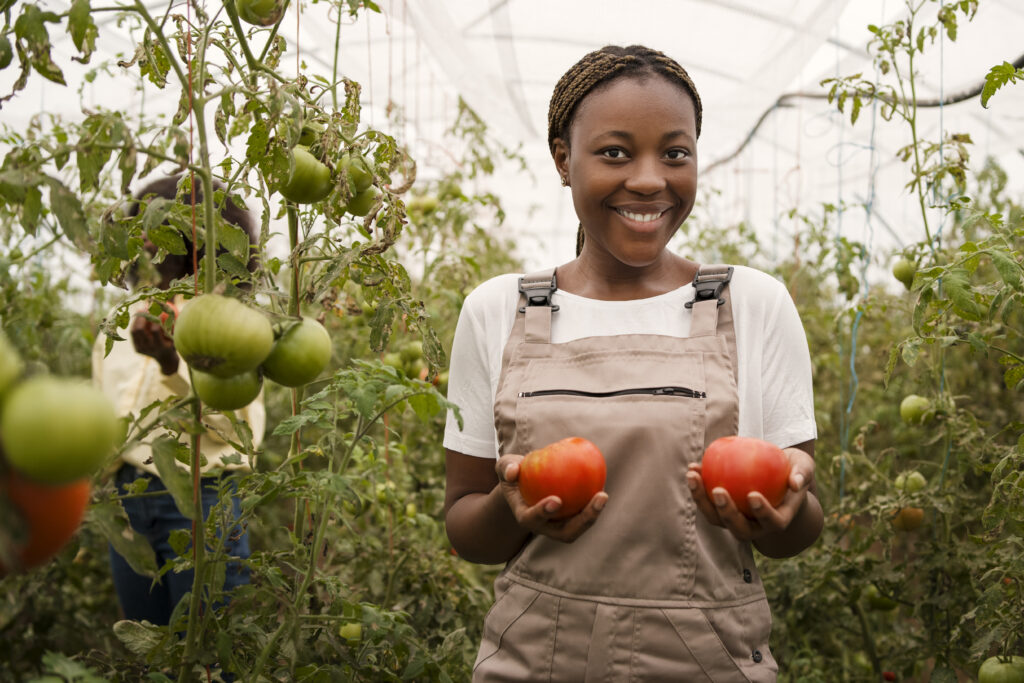1. FarmSquare
What They Do:
FarmSquare, launched in 2018, is one of Nigeria’s pioneer agri-eCommerce platforms. Unlike others focused on produce sales, FarmSquare specializes in farm inputs. You’ll find certified seeds (grains, legumes, vegetables), fertilizers (including organic and NPK blends), greenhouse kits, drip irrigation tools, solar pumps, and compact farm machinery. They also offer pre-packed input bundles tailored to specific crops perfect for planning a season’s production in one order.
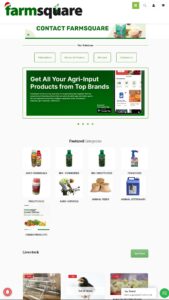
How It Works:
The platform is optimized for mobile use, even on low-speed networks. All suppliers are pre-vetted through quality control checks. FarmSquare manages the end-to-end process: from stocking in regional warehouses to delivery via verified transporters. Customers get real-time SMS alerts for every stage of their order from “Order Received” to “Delivered.” Payment options include bank transfer, mobile money, or POS on delivery. Invoices and receipts are automatically stored in your dashboard.
Why It Matters to Farmers:
– No counterfeits: All products are from trusted sources.
– Time-saving kits: Bundles eliminate the need to shop from multiple vendors.
– Cost-effective: Discounts on bulk orders and free shipping on qualifying purchases.
– Transparent delivery: Track your orders and get proof of delivery.
– Smart planning: Purchase history and budget insights help for the next planting season.
2. AgroMall
What They Do:
AgroMall combines an input marketplace with a full-service digital advisory hub. Farmers can buy seeds, agrochemicals, and micronutrients, and also access services like soil testing, crop consultancy, and even drone rentals for precision farming.

How It Works:
AgroMall offers three membership tiers:
– Free: Basic listings and order tracking
– Silver: Discounts on inputs and free soil-test credits
– Gold: Access to dedicated farm advisors and drone survey reports
When you need a service like soil testing you book through their app. An agronomist collects your sample, delivers it to a certified lab, and uploads the results to your dashboard within 72 hours. Orders for physical products are fulfilled from a certified distributor network within 2–3 days.
How It Helps You Grow:
– Smarter decisions: Lab-based soil analysis and expert advice help you apply the right inputs at the right time.
– One-stop services: Easily access consultants, equipment, and tools without jumping across vendors.
– Flexible pricing: Choose a membership plan that matches your farm’s size and budget.
– Post-harvest care: Expert guidance reduces losses from poor storage or handling.
3. Afrimash
What They Do:
Afrimash is a B2B platform offering a broad catalog of agricultural inputs—from animal feed, crop protection, and veterinary drugs to safety gear and packaging. They serve both direct farmers and agro-dealers.

How It Works:
Input vendors open a free Afrimash storefront and upload their stock with product details and pricing. Afrimash handles digital marketing—using social media and email campaigns to attract customers. When a customer places an order, Afrimash dispatches it from the nearest warehouse using vetted haulers. Multiple payment options are supported, including mobile money, POS, and bank transfer. Buyers earn loyalty credits for future purchases.
How It Helps Input Sellers and Farmers:
– Expand reach: Vendors get access to a nationwide market instantly.
– Sales without ads: Afrimash drives traffic to your store via its own marketing.
– Flexible payments: Reduced delays through multiple secure payment options.
– Cost reduction: Loyalty and bulk discounts help repeat buyers save more.
4. AgroGrid
What They Do:
AgroGrid focuses exclusively on fresh produce trading. After each harvest, farmers can list their produce—defining the grade (premium or standard), volume, and preferred pickup window. Buyers include urban food markets, restaurants, and food processing companies.
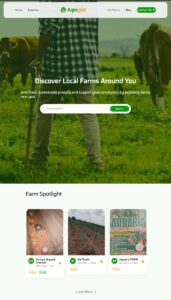
How It Works:
Using AgroGrid’s mobile app, farmers upload product photos, input weights or volumes, and get pricing suggestions instantly. Listings go live in under two minutes. Buyers filter listings by crop and location. Once an order is confirmed, AgroGrid routes it to the closest aggregation center, where produce is quality-checked, packaged, and shipped via a tracked logistics partner. Payment is held in escrow until the buyer confirms delivery.
How It Helps Farmers:
– Quick payments: Fast listings and matching help you get paid within days of harvest.
– Secure transactions: Escrow protects you from buyer delays or default.
– Fewer rejections: Aggregation centers reduce disputes with buyers.
– Peer connection: Built-in chat allows farmers to share tips, coordinate bulk deliveries, and learn from one another.
5. Livestock247
What They Do:
Livestock247 is a digital livestock marketplace serving poultry and ruminant farmers. It offers day-old chicks (broilers, layers), goats, feeds, veterinary supplies, and essential services such as vaccination, disease monitoring, and livestock health tracking.
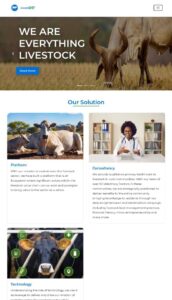
How It Works:
Listings from hatcheries, feed mills, and veterinary providers are standardized to show clear pricing, delivery zones, and package options. Farmers can order bundled products—like feed plus vaccines—through the website or POS. Products are delivered to nearby aggregation points. Livestock batches are tagged using the platform’s Animal Identification & Management System (AIMS), allowing farmers to maintain vaccination and health records. Live chat connects users to vets and agronomists for real-time guidance.
How It Helps Farmers:
– Track livestock health: Digital records improve animal care and prevent disease outbreaks.
– Secure payments: Cashless options reduce transaction risk.
– Bundle convenience: Order feed, medication, and advisory services together.
– Ready market: Direct channels to abattoirs and processors help farmers sell faster.
6. HTS Farms
What They Do:
HTS Farms promotes eco-conscious farming with a product lineup that includes organic chicks, herbal pesticides, soil enhancers, and natural feeds. The platform also hosts training workshops and runs demonstration plots to teach sustainable practices.
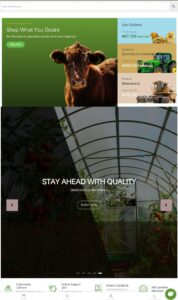
How It Works:
All products are labeled with environmental certifications like “100% Organic” or “Zero Chemical Runoff.” Farmers can subscribe to monthly delivery boxes of inputs, making budgeting predictable. Online and physical workshops cover topics such as composting, rainwater harvesting, and natural pest control. Each product page shows estimated carbon savings or sustainability impact.
How It Helps Farmers:
– Premium pricing: Eco-labels allow farmers to target higher-paying, health-conscious markets.
– Simplified planning: Subscription boxes ensure consistent input supply.
– Knowledge access: Training boosts yields while reducing long-term costs.
– Brand identity: Green practices differentiate your farm in a competitive market.
7. Farmcrowdy (FC Foods)
What They Do:
FC Foods, the retail arm of Farmcrowdy, connects rural producers with urban consumers. They source produce, eggs, and meat from their farmer network and sell directly through a branded online store and app.

How It Works:
Farmers join the platform under an off-taker model: they receive inputs and advisory support on credit, and in exchange, Farmcrowdy commits to buying their harvest at a pre-set price. After harvest, goods are processed, cold-stored, and listed for sale to consumers. Buyers pick a delivery window, pay online, and track their orders in real-time.
How It Helps Farmers:
– Predictable income: Know how much you’ll earn before planting.
– Reduced losses: Farmcrowdy handles post-harvest care, packaging, and delivery.
– Urban market access: Sell to a retail audience without needing your own storefront.
– Traceability: Farm-to-fork tracking lets you build a premium brand around quality.
8. Tramsfarms (Transfers)
What They Do:
TRAMSFARMS is both a working farm and a digital agro-marketplace. Through its marketplace feature, Transfers, farmers can list fresh produce (maize, yams, peppers), agro-inputs (like compost and seedlings), and processed products (such as garri and dried spices) with zero listing fees and real-time support.
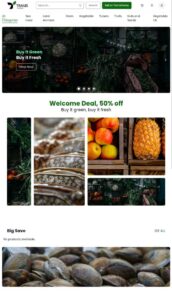
How It Works:
– Farmer-first listings: Agents or sellers upload product details manually, often with photos and harvest info. As part of its grassroots approach, Tramsfarms provides direct onboarding support via call or chat.
– Logistics coordination: The platform partners with trusted haulers to arrange pickup and delivery, minimizing delays and spoilage where possible.
– Transparent pricing: Tramsfarms is actively developing a live market pricing dashboard to help sellers compare rates across Nigerian cities like Lagos, Kano, and Port Harcourt.
– Sustainable model: Platform revenue comes from a mix of buyer commissions and sales from Tramsfarms’ own farm, allowing for flexible pricing and community support.
How It Helps Farmers:
– No subscription fees: Farmers can start listing without upfront costs.
– Personalized onboarding: Sellers get real help — not just forms to fill.
– Less waste: Coordinated logistics reduce transport loss and delivery delays.
– Year-round buyer access: Even during low seasons, the platform remains active through Tramsfarms’ own produce.
– Future-ready tools: Planned features like a mobile app and blockchain-powered funding will give smallholders better access to finance and visibility.
